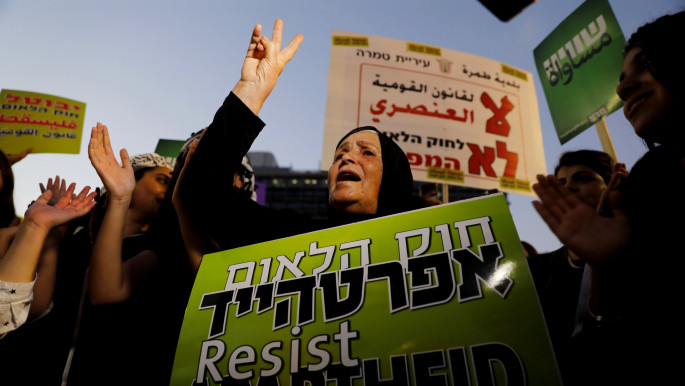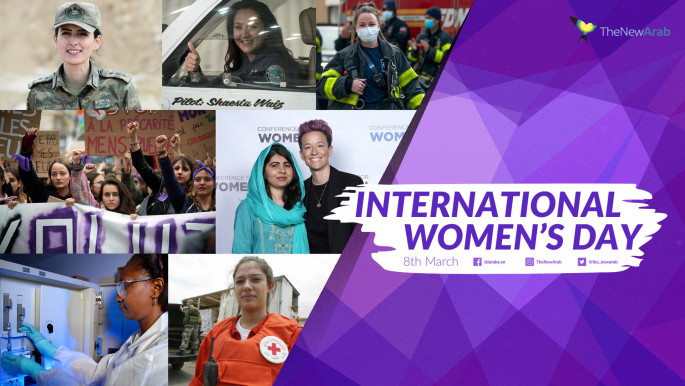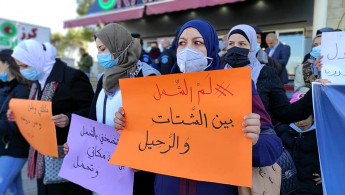'We've been locked down for 15 years': The Palestinian women fighting Israel's family reunification ban
Hend Almasri hasn't seen her mother in 10 years. In 2012, the Jordanian native moved to Palestine with her husband and children and applied for family unification.
She is still waiting for her request to be approved so she can obtain a Palestinian ID and move freely within Palestine.
Tens of thousands of individuals feel like they are doubly imprisoned in the occupied West Bank, where an encounter with Israeli authorities could mean deportation.
"People are complaining about being in lockdown for one year," Almasri said referring to coronavirus restrictions. "But we've been locked down for 10 or 15 years."
Without an ID and with her travel documents expired, Almasri is confined to her home in Nablus. She can't get an education, open a bank account, get a driver's license, a SIM card or access public health care.
When Almasri's mother became ill two months ago, she finally had enough. So Almasri – along with other women – began protesting on and offline for the right to family reunification.
The 'Reunification Is My Right' campaign launched in 2017. But the upcoming Palestinian elections have reenergised the movement, with the activists hoping the current political climate will draw attention to their cause.
 |
Israel placed a ban on family unification procedures in 2000 during the outbreak of the Second Intifada |  |
On 21 February, the campaign held a sit-in outside of the office of the Palestinian General Authority for Civil Affairs, the entity responsible for following up on family reunification requests with Israel.
The activists are also working with human rights organisations and sent a letter to the King of Jordan in the hope that the international community can pressure Israel to grant them IDs. The Palestinian General Authority for Civil Affairs did not respond to repeated requests for comment.
Israel using family unification as a bargaining chip
The Oslo Accords gave the Palestinian Authority (PA) control over the population registry in the Occupied Territories - except for cases regarding family unification. These procedures would be handled by Israel with the PA acting as a middleman and providing the Israeli government with applications for approval.
 |
|
| Read more: How Israel is using the nation-state law to perpetuate racial segregation |
Israel placed a ban on family unification procedures in 2000 during the outbreak of the Second Intifada. Ties were further severed when Hamas came into power following the Palestinian parliamentary elections in 2006 and when Benjamin Netanyahu became prime minister of Israel in 2009.
In June 2020, the Knesset (Israeli parliament) voted to uphold the freeze on family reunification again until June 2021.
Alaa Mutair moved to Palestine from Jordan in 2011 and is still waiting for an ID. "The Israeli government always breaks these agreements whenever there's a hot political situation," Mutair explained.
The 'Reunification Is My Right' movement demands their applications be treated as a normal process of naturalisation instead of having their rights become politicised. "Why is Israel turning this humanitarian file into a political issue?" Almasri said. "We are not refugees."
While the majority of cases are Jordanian women, Almasri emphasised that the problem affects immigrants coming to Palestine from all over the world. Some have even become trapped in the West Bank after moving from the Gaza Strip.
"When the war started in Gaza 20 years ago, some families escaped and came to the West Bank and the same thing happened to them. They couldn't get Israel to approve the change of address," Almasri said. "Some of them were arrested and deported back to Gaza by Israeli border police. So, separation between families is happening, with fathers in Gaza and the rest of family in the West Bank."
 |
We don't have an ID and that's a matter of existence. It's as if we don't exist on this planet |  |
Prisoners in their own homes
Despite actively demonstrating and the campaign's pleas to Minister of Civil Affairs, Hussein Al Sheikh, progress is slow.
"We waited for long years and there's no news. We ask the officials and no one gives us a good answer," Lana Yousef said. Originally from Jordan, Yousef moved to Palestine in 2014.
"I had two children and they did not see my family. They don't know them," Yousef said. "My father passed away five years ago from a heart attack. I wasn't there. I couldn't be at his funeral. I couldn't say goodbye to him because if I went I wouldn't be able to get back to my home here."
 |
|
| Read more: The unfinished gender equality revolution of the Arab Spring |
The issue goes both ways. Yousef and Mutair say moving back to Jordan would cause difficulties for their Palestinian family in obtaining the necessary work and residency permits. So instead, these women rarely travel within the West Bank in fear of being separated from their husbands and children.
"I'm a prisoner of my house for the past 10 years," Mutair said. "Prisoners in jail are better off because they know when they will be out of prison. But I never go out and I don't know when I'll be free."
Amid all the risks associated with speaking out, these women feel they no longer have a choice if they want a solution.
"We are not afraid anymore," Yousef said. "We don't have an ID and that's a matter of existence. It's as if we don't exist on this planet."
Jessica Buxbaum is a Jerusalem-based journalist covering Palestine and Israel. Her work has been featured in Middle East Eye, The National and Gulf News. Follow her on Twitter: @jess_buxbaum
 |
|



